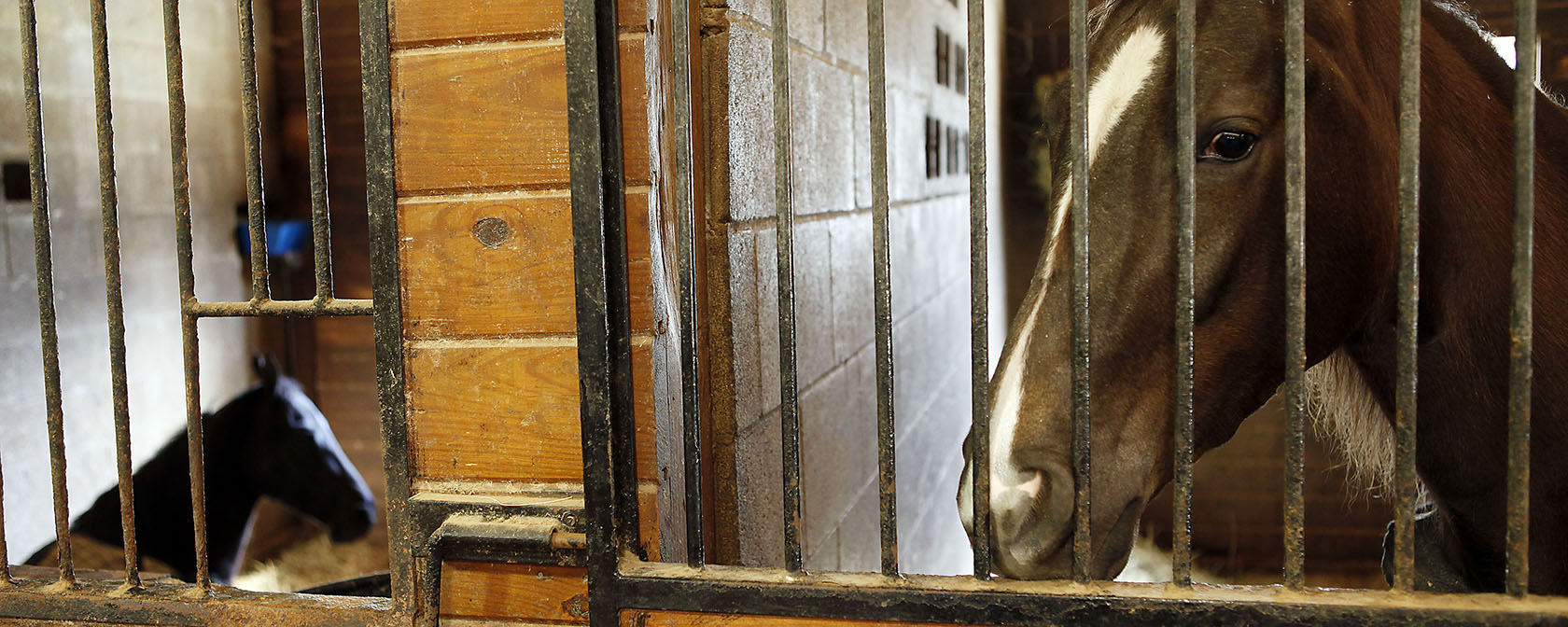By Sara Amundson and Kitty Block
It is a long way from the stable, paddock and winner’s circle at Churchill Downs to the dark, dank and bloody slaughterhouses in which tens of thousands of American horses meet their sad and pitiable end each year.
Yet some former racehorses do make that terrible journey, and it’s hard not to think of them on the eve of the Kentucky Derby, the most celebrated of races.
The most dispiriting story of all might be that of Ferdinand, the 1986 Kentucky Derby winner who retired as horse racing’s fifth-leading earner of all time and was sold to a stud farm in Japan in 1989. A few years later, with no notice to his former owners, Ferdinand was sent to slaughter, for use in pet food or for human consumption. More recently, in 2020, Private Vow, a 2006 Derby runner, met his end the same way in Korea.
The stories of these and other horses lead to one awful conclusion. Of all modern threats to the horse in the United States, horse slaughter stands out for its sheer callousness and deceitfulness. It’s a problem rooted in wrong and outdated views of horses and how we should treat them, and it’s a problem of our own making here in the United States. For that reason, we have to solve it here, too.
The international export trade that allows horse slaughter to continue can be summed up in a sentence. Year after year, after lives of trusting companionship and—in so many cases—loyal service, tens of thousands of American horses are cast off and condemned to an arduous cross-border journey into Mexico or Canada that ends with their death.
We’re trying to bring this horse slaughter pipeline to an end, and we’re getting closer to that goal than ever. The federal Save America’s Forgotten Equines (SAFE) Act has 216 cosponsors in the House of Representatives, and we’re pressing leaders in Congress to advance the measure for passage in the remaining months of the session.
Animal advocates have been fighting to end the slaughter of American horses since the 1990s and have made steady progress. In 2007, three federal courts upheld state legislation that effectively prohibited the sale of horsemeat for human consumption, which in turn effectively shut down the operation of horse slaughter plants on American soil. Since then, we have kept the industry here on ice by ensuring, year after year, that no federal funds can be used for USDA inspection of such plants.
This de facto ban on domestic horse slaughter did not end the trade, however, and stopping the export market has proven to be a difficult challenge. The killing shifted to Canada and Mexico, where there is an existing slaughter industry satisfying the appetite for horsemeat in Europe and Asia. Today, a network of bottom-feeding “kill buyers” in our own country continues to outbid potential caring owners and export American horses across our borders for slaughter. In 2021, 23,431 horses were exported for slaughter, down 13,454 from the previous year—a 36.5% decrease. Yet it’s still a shocking number, and a great betrayal of horses.
Passage of the SAFE Act would take the United States out of the circuit of cruelty as a supplier of horses to a grisly global trade in horse flesh. It’s a simple bill that permanently bans domestic horse slaughter as well as the export of American horses for slaughter elsewhere, something that 83% of citizens support. With the issue receiving a hearing in the Health Subcommittee in January 2020 and with nearly half the members of the House and six members of the Senate currently on as cosponsors, we are in the final stretch of getting this bill passed into law.
There are many in the racing industry who agree with us that horse slaughter is way out of step with American values. The Jockey Club, The Breeders’ Cup, the New York Racing Association and The Stronach Group (owner of five prominent racetracks) are all active in the campaign. Hall of Fame jockey and founding member of the HSUS National Horse Racing Advisory Council Chris McCarron has also stood tall in the fight, authoring editorials in two Kentucky newspapers, one in Lexington and one in Louisville, just days before this year’s Derby contestants line up at the starting gate.
Another one of the strongest voices in this struggle is that of Joe De Francis, onetime CEO of the Maryland Jockey Club and the chair of the HSUS National Horse Racing Advisory Council. De Francis has been a principled and consistent critic of horse slaughter and played a leadership role in spurring the industry to confront the problem directly. He has also been a stalwart in the broader campaign for horse racing reforms, testifying and advocating on behalf of the Horseracing Integrity and Safety Act (HISA, which we worked to enact in 2020) and playing a lead role in its implementation. As a Director of the Horseracing Integrity and Safety Authority, the national oversight body created by the Act, De Francis strongly supports and endorses the Authority’s decision to select Drug Free Sport International to create the Horseracing Integrity and Welfare Unit that will serve as the enforcement agency for the drug and medication portion of HISA's mandate.
There are no easy victories in the animal protection universe. They are all hard-won, and the fight to end horse slaughter has been one of the most demanding and difficult ones we have ever had to wage. Now, during this Triple Crown season, we urge you to join us in a critical push for passage of the SAFE Act. The slaughter pipeline is no place for our horses, and once the bill becomes law, they won’t ever have to face that horror.
Kitty Block is President and CEO of the Humane Society of the United States.




